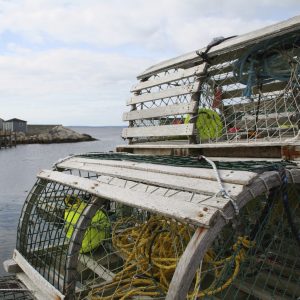Student Researcher Hits the Depths with Lobstermen; Says They Teach Each Other
 Conducting research aboard a lobster boat involves a lot more than research.
Conducting research aboard a lobster boat involves a lot more than research.
“There’s a lot of really getting your hands dirty. I’ve spent a lot of time fishing with these guys,” said Jocelyn Runnebaum, a UMaine PhD student in Marine Biology, who spent the spring and summer collecting data on cusk in the Gulf of Maine.
The fishermen, conversely, provided her with a living, breathing, floating research lab, an essential part of a project designed to seek solutions to a tough problem: increasing the survival of incidentally caught cusk to help the cusk population. The bottom-dwelling fish are a federal “species of concern” and a candidate for the U.S. Endangered Species List.
The work involved a lot of long days way out on the gulf sharing information with five different lobster boat captains who agreed to take part in the project. Cusk often bumble into their traps on the gulf floor, becoming slimy unwanted guests aboard busy vessels. Runnebaum is working on a way to keep cusk alive by lowering them back down to their dark, rocky home.
The research is funded through the Senator George J. Mitchell Center for Sustainability Solutions, part of the Emerging Opportunities – Foundations for Future Research grant program. The project involves working directly with lobstermen and government agencies to find real-life solutions to a complex quandary. How, she and co-researchers asked, can the cusk survive without hurting the economy of the fishery?
It’s the kind of collaborative approach to complex problems that Runnebaum is interested in basing her studies and work around. One of her overarching interests is building sustainable global food systems. Cusk, Runnebaum says, offer something of an anecdote. Story continues here…
